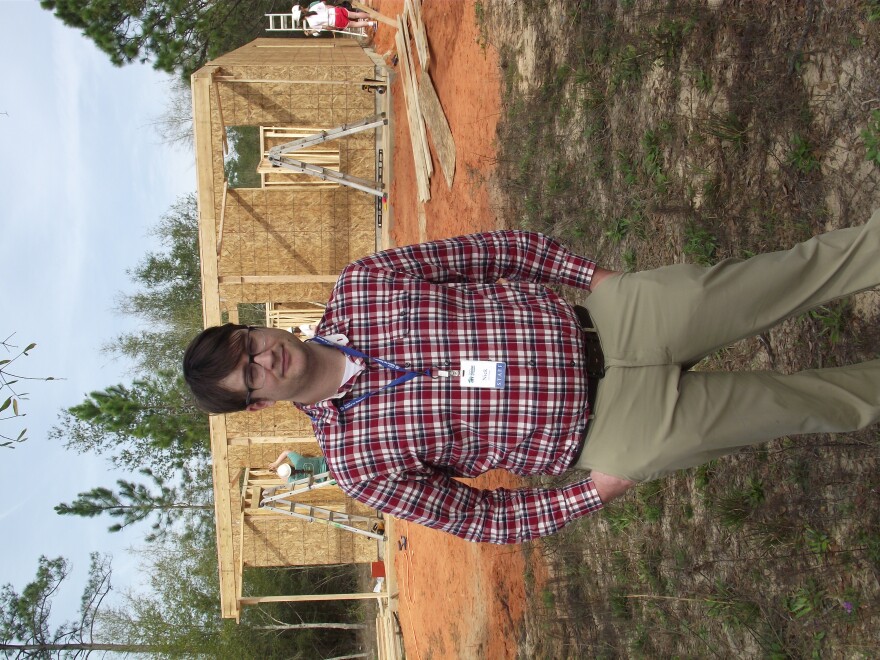With Spring Break now coming to an end for a majority of college students across the country, many will return to the classroom with stories of days and nights spent partying down in Daytona or Panama City Beach. Some students, however, invested their time in what is commonly referred to as an “alternative spring break,” building homes for families in need.
For nearly three decades, Habitat for Humanity has welcomed thousands of vacationing students.
Students from the University of North Georgia and Purdue University took time out of their schedules to come down to the Pensacola area to take part in a Habitat program called Collegiate Challenge. The combined group of about 20 students worked together to build two new homes in East Milton.
“As far as the spring break goes, the Collegiate Challenge, we have 13 colleges this year that have been participating ranging from Ohio State to Virginia Tech to the two that we have right now which is Purdue and University of North Georgia,” said Nick Noyes of the Pensacola chapter of Habitat for Humanity, which serves Escambia and Santa Rosa counties.

The Collegiate Challenge, which was started back in 1989, provides students with the opportunity to spend several days working with Habitat affiliates to build homes and improve communities. From the 13 colleges participating locally this year, 153 students pledged their help and their money, bringing in about $26,000 to go towards building materials.
“What the students of Collegiate Challenge do, typically, is they’ll build new homes," said Noyes. "And they do that after we lay out the concrete slabs. These are going to be for potential new home owners. At Habitat, we sell our homes at a no interest mortgage. So these are built in preparation for having new homeowners who need a place to live out in Milton."
The students complete the majority of the construction themselves, leaving specialized jobs such as plumbing and electrical work to licensed professionals. In just the last two years, Collegiate Challenge has put up more than 20 homes between Escambia and Santa Rosa counties. Since starting 26 years ago, the initiative has raised over $25 million in donations for Habitat affiliates, across the country.
Locally, students from Maryville University also made the trip down to Pensacola for this year’s Collegiate Challenge, marking the school’s 16th year participating.
“So, as you can tell, it’s quite a legacy. It’s something that’s really important to these universities, to come down here and help us with our efforts,” said Noyes.
From the University of North Georgia, junior Greg Brannon was one of the students working to build homes in East Milton.
“I was down in Vero Beach last spring break. Had such a good time I decided to come back,” Brannon said, noting that this is his second time taking part in the Collegiate Challenge, and his first time here in the Pensacola area. “It’s overwhelming when you first see it. I mean, you look at it and it’s a concrete slab. And in one day, you have walls up and it’s starting to take shape, kind of, it looks like a house, it’s starting to,” he said.
Visiting with a group from Purdue University was Joseph Bauer, a senior studying atmospheric science. This trip marked his third and final alternative spring break. Last year he spent time helping out in West Virginia and the year before that he was in New Orleans for his first experience with the Collegiate Challenge.

“I think it’s just a much better way of spending your time, in the community, helping our fellow brothers and sisters in Christ," Bauer said. "And so, it’s part of our faith mission at St. Tom’s, a part of being Catholic or any Christian for that matter. So, just sharing the service that Christ gave us the example of in His story.”
While his experiences in the past have been great, Bauer said his time here with the Collegiate Challenge has been especially rewarding.
“Previous projects we’ve kind of picked up where other people left off. But for this it’s something that we can see exactly what all we’ve done because we started from a blank slate of concrete.”
The fact that these students are here to help build homes doesn’t erase the fact that it is Spring Break.
While the students spend the first part of their day out working on building new homes, Brannon and Bauer said after their work on site is done, they’re free to do what they want.
“Usually a shower is the first thing. And then we’ll probably go to the beach today after we finish up,” said Brannon. Bauer added, “We’ve got a house actually on the beach in Pensacola. So we’ll go back there, relax, play Catch Phrase, have dinner and Mass together, get on the beach.”
In addition to the downtime after their work day ends, the students from the Collegiate Challenge are invited to take part in an appreciation dinner each Monday. The dinner, put together by the Pensacola Hospitality Project, also serves as a token of gratitude for volunteers from other visiting groups who have traveled to Pensacola to help with flood restoration efforts coordinated by BRACE.
“So what we thought we would bring to the table is a place for these volunteers to meet, to eat, and just to have a little ounce of fun before they start up again doing the work that is so appreciated by the community,” said Habitat’s Nick Noyes.
Habitat for Humanity’s Collegiate Challenge for this year is wrapping up. Early bird registration for next year opens up in the fall. For more information, visit www.habitat.org.






